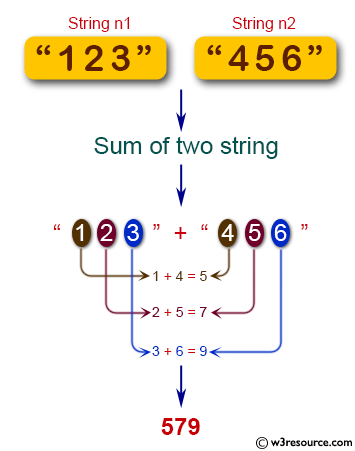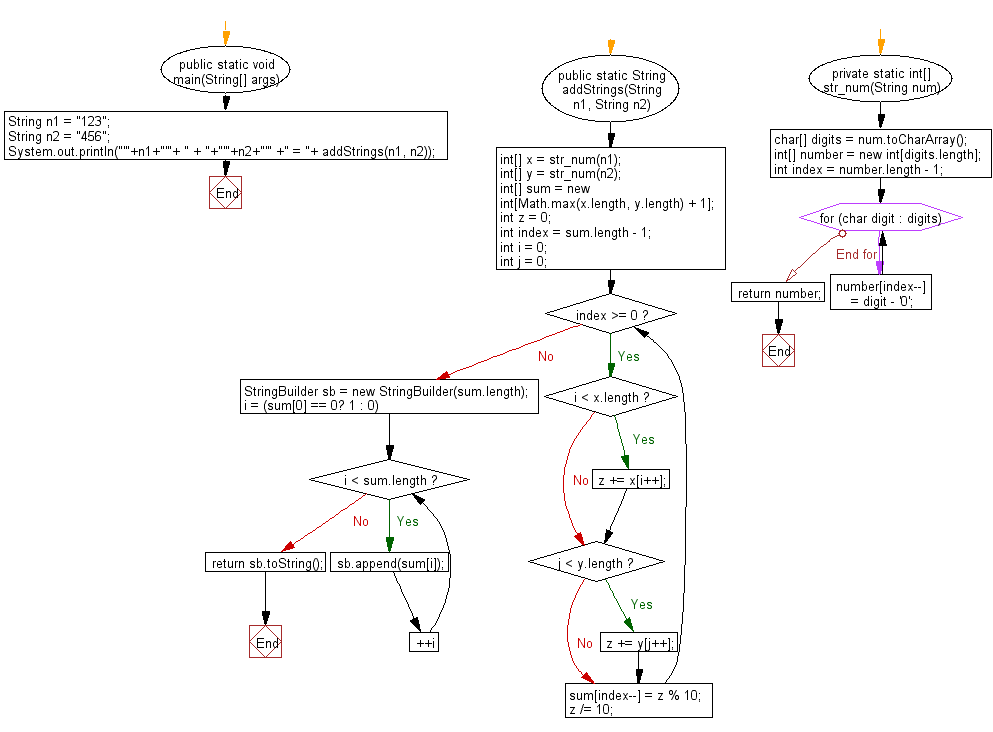Java: Given two non-negative integers represented as string, return their sum
Sum Two Numbers as Strings
Write a Java program to two non-negative integers num1 and num2 represented as strings, return the sum of num1 and num2.
Visual Presentation:

Sample Solution:
Java Code:
// Importing necessary Java utilities
import java.util.*;
// Main class Solution
public class Solution {
// Main method
public static void main(String[] args) {
// Declaring and initializing two strings representing numbers
String n1 = "123";
String n2 = "456";
// Printing the addition of two strings representing numbers
System.out.println("'" + n1 + "'" + " + " + "'" + n2 + "'" + " = " + addStrings(n1, n2));
}
// Method to add two strings representing numbers
public static String addStrings(String n1, String n2) {
// Convert input strings to integer arrays
int[] x = str_num(n1);
int[] y = str_num(n2);
// Initialize an array to store the sum, considering carry
int[] sum = new int[Math.max(x.length, y.length) + 1];
int z = 0;
int index = sum.length - 1;
int i = 0;
int j = 0;
// Iterate through both integer arrays to calculate the sum
while (index >= 0) {
if (i < x.length) {
z += x[i++];
}
if (j < y.length) {
z += y[j++];
}
sum[index--] = z % 10;
z /= 10; // store the carry
}
// Construct the sum string from the array
StringBuilder sb = new StringBuilder(sum.length);
for (i = (sum[0] == 0 ? 1 : 0); i < sum.length; ++i) {
sb.append(sum[i]);
}
return sb.toString();
}
// Helper method to convert a string of digits to an integer array
private static int[] str_num(String num) {
char[] digits = num.toCharArray();
int[] number = new int[digits.length];
int index = number.length - 1;
for (char digit : digits) {
number[index--] = digit - '0'; // Convert character to integer and store in the array
}
return number;
}
}
Sample Output:
'123' + '456' = 579
Flowchart:
For more Practice: Solve these Related Problems:
- Write a Java program to subtract one non-negative integer represented as a string from another.
- Write a Java program to multiply two large numbers provided as strings without using built-in multiplication.
- Write a Java program to perform division on two non-negative integers represented as strings without converting them to numeric types.
- Write a Java program to add two very large integers represented as strings, handling potential overflow.
Go to:
PREV : Find Anagram Start Indices.
NEXT :
Find Missing String.
Java Code Editor:
Contribute your code and comments through Disqus.
What is the difficulty level of this exercise?
Test your Programming skills with w3resource's quiz.

